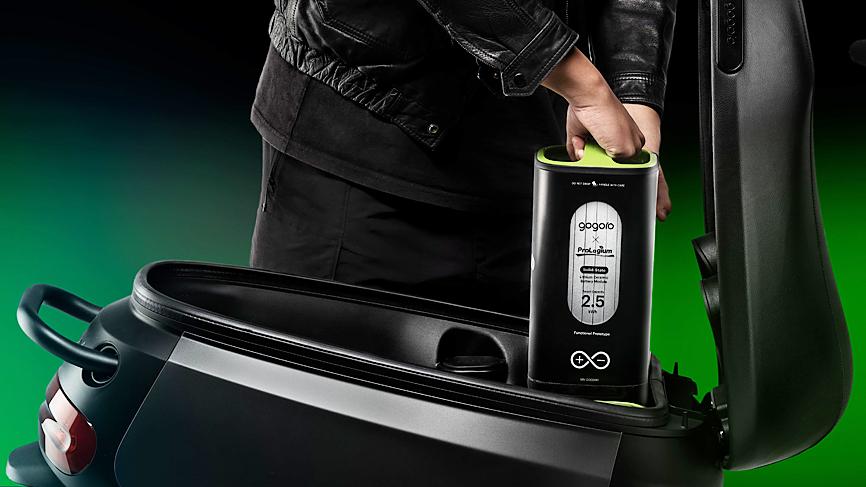Gogoro Inc (睿能創意) yesterday unveiled a prototype solid-state swappable battery that it developed with ProLogium Technology Co (輝能科技), saying that it would provide greater range for its electric scooters.
Gogoro said it plans to introduce the higher-density lithium ceramic batteries in the next three to four years.
The development makes Gogoro a global leader in solid-state lithium ceramic batteries, following similar developments by leading automakers such as Toyota Motor Corp, General Motors Co and Mercedes-Benz.

Photo courtesy of Gogoro Inc
Without flammable liquid electrolytes, solid-state lithium ceramic batteries are considered safer than traditional lithium-ion batteries.
“We partnered with ProLogium Technology, a global leader in solid-state battery innovation, to develop this new battery that delivers higher-energy density for better range, improved stability and safety, and is reverse compatible with all existing Gogoro-powered vehicles,” Gogoro chairman Horace Luke (陸學森) said in a statement.
Gogoro, an electric scooter maker and battery swapping solutions provider, has estimated that its solid-state batteries would increase capacity of its lithium batteries by 47 percent to 2.5 kilowatt-hours (kWh) from 1.7kWh.
Gogoro said that it does not plan to make an equity investment in ProLogium.
The company said that it would start introducing the batteries for its various generations of electric scooters when the technology strikes a balance between manufacturing costs, power capacity and safety.
Since 2015, Gogoro has made 1 million lithium-ion battery packs.
Solid-state lithium batteries are mostly the subject of research or are in pilot production and their manufacturing costs are much higher than traditional lithium-ion batteries. No company has successfully commercialized the technology yet.
ProLogium, headquartered in Taoyuan, said that it has made better progress than its global rivals and is building a mass production line in Taoyuan with an annual capacity of 2 gigawatts (GW) to 3GW.
The production line is to start operations at the end of this year, Lisa Hsu (許容禎), the company’s deputy director for marketing, said yesterday.
The company believes that it has a good opportunity to reduce the manufacturing costs of solid-state ceramic batteries to a level similar to traditional lithium-ion batteries over the next few years, when its battery manufacturing capacity increases to about 30GW, Hsu said.
ProLogium has provided nearly 8,000 solid-state battery cells to global automakers for testing and module development since its establishment in 2006.

SELL-OFF: Investors expect tariff-driven volatility as the local boarse reopens today, while analysts say government support and solid fundamentals would steady sentiment Local investors are bracing for a sharp market downturn today as the nation’s financial markets resume trading following a two-day closure for national holidays before the weekend, with sentiment rattled by US President Donald Trump’s sweeping tariff announcement. Trump’s unveiling of new “reciprocal tariffs” on Wednesday triggered a sell-off in global markets, with the FTSE Taiwan Index Futures — a benchmark for Taiwanese equities traded in Singapore — tumbling 9.2 percent over the past two sessions. Meanwhile, the American depositary receipts (ADRs) of Taiwan Semiconductor Manufacturing Co (TSMC, 台積電), the most heavily weighted stock on the TAIEX, plunged 13.8 percent in

A wave of stop-loss selling and panic selling hit Taiwan's stock market at its opening today, with the weighted index plunging 2,086 points — a drop of more than 9.7 percent — marking the largest intraday point and percentage loss on record. The index bottomed out at 19,212.02, while futures were locked limit-down, with more than 1,000 stocks hitting their daily drop limit. Three heavyweight stocks — Taiwan Semiconductor Manufacturing Co (TSMC, 台積電), Hon Hai Precision Industry Co (Foxconn, 鴻海精密) and MediaTek (聯發科) — hit their limit-down prices as soon as the market opened, falling to NT$848 (US$25.54), NT$138.5 and NT$1,295 respectively. TSMC's

TARIFFS: The global ‘panic atmosphere remains strong,’ and foreign investors have continued to sell their holdings since the start of the year, the Ministry of Finance said The government yesterday authorized the activation of its NT$500 billion (US$15.15 billion) National Stabilization Fund (NSF) to prop up the local stock market after two days of sharp falls in reaction to US President Donald Trump’s new import tariffs. The Ministry of Finance said in a statement after the market close that the steering committee of the fund had been given the go-ahead to intervene in the market to bolster Taiwanese shares in a time of crisis. The fund has been authorized to use its assets “to carry out market stabilization tasks as appropriate to maintain the stability of Taiwan’s

STEEP DECLINE: Yesterday’s drop was the third-steepest in its history, the steepest being Monday’s drop in the wake of the tariff announcement on Wednesday last week Taiwanese stocks continued their heavy sell-off yesterday, as concerns over US tariffs and unwinding of leveraged bets weighed on the market. The benchmark TAIEX plunged 1,068.19 points, or 5.79 percent, to 17,391.76, notching the biggest drop among Asian peers as it hit a 15-month low. The decline came even after the government on late Tuesday authorized the NT$500 billion (US$15.2 billion) National Stabilization Fund (國安基金) to step in to buoy the market amid investors’ worries over tariffs imposed by US President Donald Trump. Yesterday’s decline was the third-steepest in its history, trailing only the declines of 2,065.87 points on Monday and